Serving 380 students in grades Kindergarten-5, P.s. 35 Franz Siegel ranks in the bottom 50% of all schools in New York for overall test scores (math proficiency is bottom 50%, and reading proficiency is bottom 50%).
The percentage of students achieving proficiency in math is 11% (which is lower than the New York state average of 46%). The percentage of students achieving proficiency in reading/language arts is 22% (which is lower than the New York state average of 49%).
The student:teacher ratio of 12:1 is higher than the New York state level of 11:1.
Minority enrollment is 99% of the student body (majority Hispanic), which is higher than the New York state average of 60% (majority Hispanic).
Quick Stats (2025)
- Grades: Kindergarten-5
- Enrollment: 380 students
- Student:Teacher Ratio: 12:1
- Minority Enrollment: 99%
- Overall Testing Rank: Bottom 50% in NY
- Math Proficiency: 11% (Btm 50%)
- Reading Proficiency: 22% (Btm 50%)
- Science Proficiency: 55-59% (Btm 50%)
- Source: National Center for Education Statistics (NCES), NY Dept. of Education
Top Rankings
P.s. 35 Franz Siegel ranks among the top 20% of public schools in New York for:
Category
Attribute
Percent Eligible For Free Lunch
School Overview
P.s. 35 Franz Siegel's student population of 380 students has declined by 38% over five school years.
The teacher population of 32 teachers has declined by 38% over five school years.
Grades Offered
Grades Kindergarten-5
(offers virtual instruction)
(offers virtual instruction)
Total Students
380 students
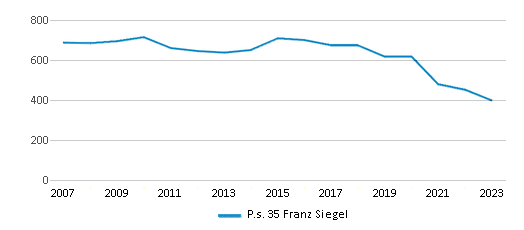
Gender %
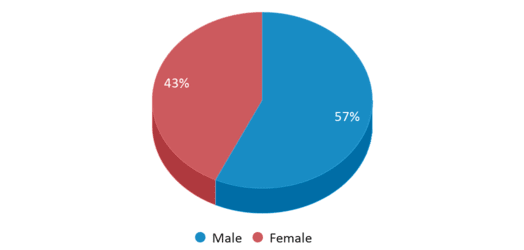
Total Classroom Teachers
32 teachers
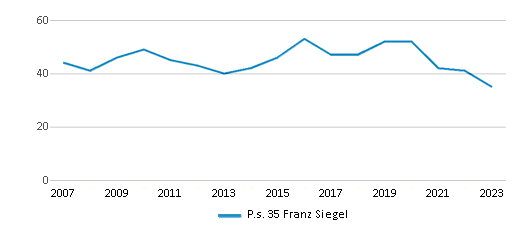
Students by Grade
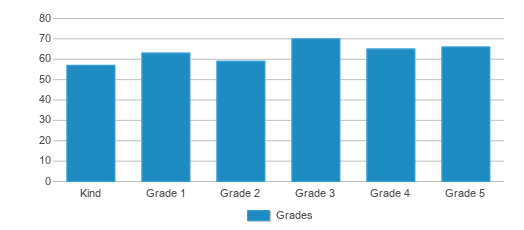
School Rankings
P.s. 35 Franz Siegel ranks within the bottom 50% of all 4,377 schools in New York (based off of combined math and reading proficiency testing data).
The diversity score of P.s. 35 Franz Siegel is 0.41, which is less than the diversity score at state average of 0.72. The school's diversity has stayed relatively flat over five school years.
Overall Testing Rank
#4161 out of 4377 schools
(Bottom 50%)
(Bottom 50%)
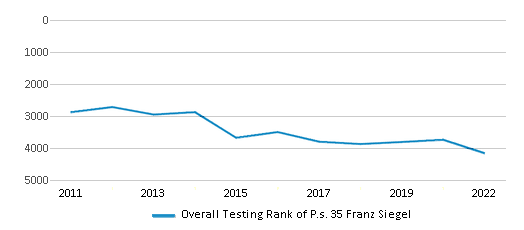
Math Test Scores (% Proficient)
11%
46%
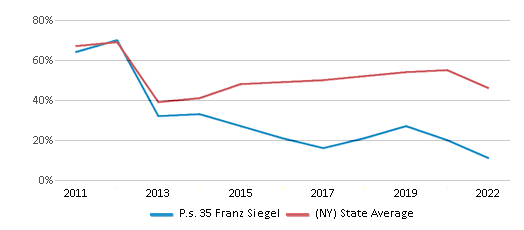
Reading/Language Arts Test Scores (% Proficient)
22%
49%
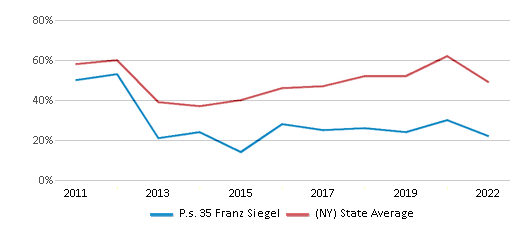
Science Test Scores (% Proficient)
55-59%
78%
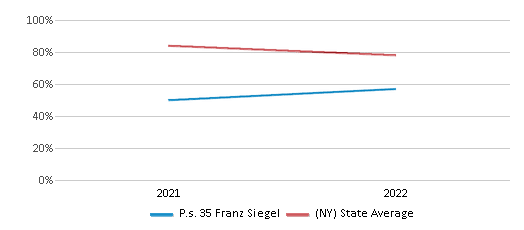
Student : Teacher Ratio
12:1
11:1
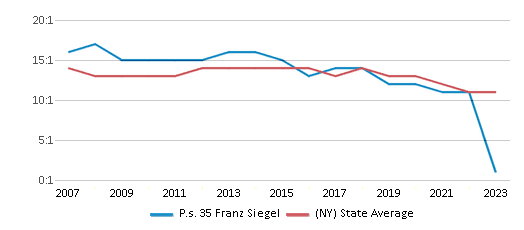
American Indian
1%
1%
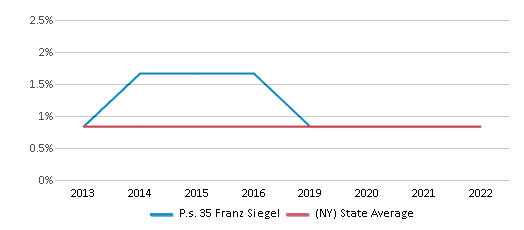
Asian
n/a
10%
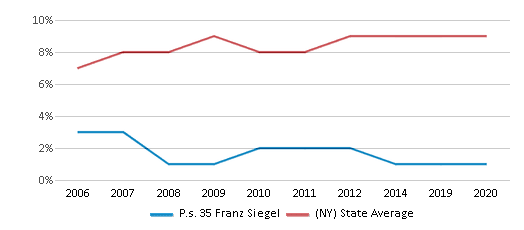
Hispanic
73%
30%
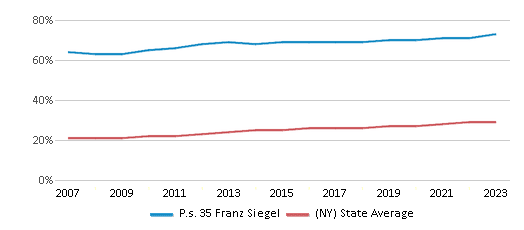
Black
24%
16%
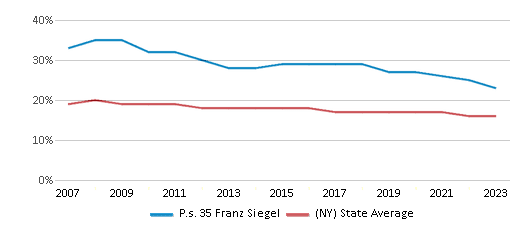
White
1%
40%
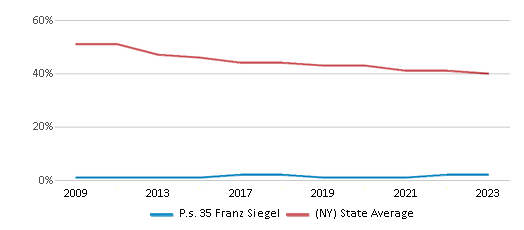
Hawaiian
n/a
n/a
Two or more races
1%
3%
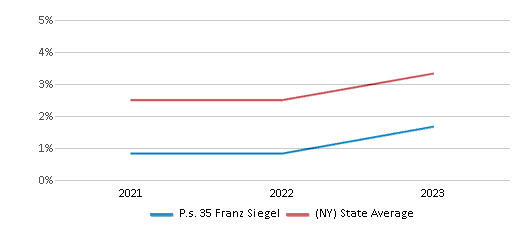
All Ethnic Groups
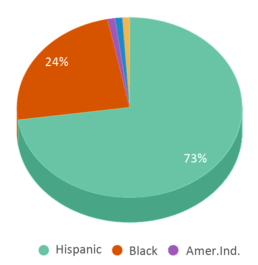
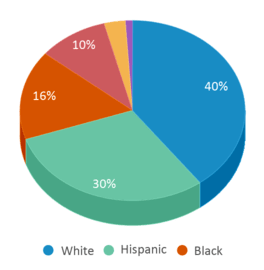
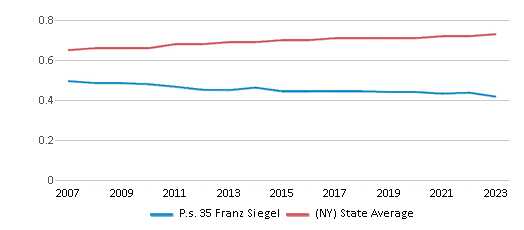
Participates in the National School Lunch Program (NSLP)
Yes
Eligible for Free Lunch
96%
54%
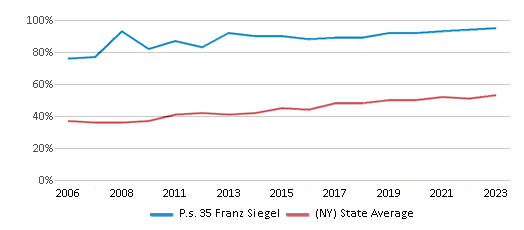
Eligible for Reduced Lunch
2%
3%
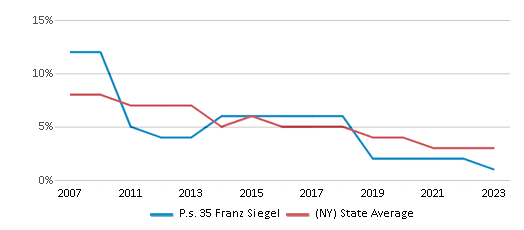
School Statewide Testing
School District Name
Source: National Center for Education Statistics (NCES), NY Dept. of Education
Profile last updated: 02/09/2025
Frequently Asked Questions
What is P.s. 35 Franz Siegel's ranking?
P.s. 35 Franz Siegel is ranked #4161 out of 4,377 schools, which ranks it among the bottom 50% of public schools in New York.
What schools are P.s. 35 Franz Siegel often compared to?
P.s. 35 Franz Siegelis often viewed alongside schools like P.s. 28 Mount Hope, P.s. 42 Claremont by visitors of our site.
What percent of students have achieved state testing proficiency in math and reading?
11% of students have achieved math proficiency (compared to the 46% NY state average), while 22% of students have achieved reading proficiency (compared to the 49% NY state average).
How many students attend P.s. 35 Franz Siegel?
380 students attend P.s. 35 Franz Siegel.
What is the racial composition of the student body?
73% of P.s. 35 Franz Siegel students are Hispanic, 24% of students are Black, 1% of students are American Indian, 1% of students are White, and 1% of students are Two or more races.
What is the student:teacher ratio of P.s. 35 Franz Siegel?
P.s. 35 Franz Siegel has a student ration of 12:1, which is higher than the New York state average of 11:1.
What grades does P.s. 35 Franz Siegel offer ?
P.s. 35 Franz Siegel offers enrollment in grades Kindergarten-5 (offers virtual instruction).
What school district is P.s. 35 Franz Siegel part of?
P.s. 35 Franz Siegel is part of New York City Geographic District # 9 School District.
In what neighborhood is P.s. 35 Franz Siegel located?
P.s. 35 Franz Siegel is located in the Concourse Village neighborhood of Bronx, NY. There are 22 other public schools located in Concourse Village.
School Reviews
5 6/14/2010
I went to P.S. 35 1957-1962, for grades K-5. The academic programs were quite adequate as I have gone on to earn a B.S. in Biology and to a successful career. I remember this school fondly, especially Miss Kahn, Mrs. Sass, Miss Hoppenfeld, Miss Streich and Mrs. Kranzberg.
5 7/1/2007
The academic programs of this school were adequate, as I am a graduate of P.S. 35 and I am currently in private boarding school in upstate NY as a result of the excellent background I recieved there. Although I was only there for my 4th grade year, Ms. Nixon and Ms. Koster were notable mentors for myself and the other children. I seem to remember the food being quite good, and parental involvement acceptable. The facilities weren't in bad repair, but it is very likely that they have improved since I haven't set foot in that school for over 5 years.
Academic and athletic awards do exist - I was valedictorian of my graduating class and the jocks in my class recieved awards as well.
This is a good school and I remember it with a certain warmth and fondness. If the school is still anything like it was when I went there, you're child will be in good hands.
Review P.s. 35 Franz Siegel. Reviews should be a few sentences in length. Please include any comments on:
- Quality of academic programs, teachers, and facilities
- Availability of music, art, sports and other extracurricular activities
Recent Articles

Sexual Harassment at Age 6: The Tale of a First Grade Suspension
A six-year old in Aurora, Colorado, was suspended after singing an LMFAO song to a little girl in his class and reportedly “shaking his booty.” We look at the case and the sexual harassment problem in public schools today.

How Scaffolding Could Change the Way Your Child Learns
This article explores the concept of instructional scaffolding, a teaching method that enhances learning by breaking down complex tasks into manageable parts. It highlights how scaffolding supports students in developing critical thinking skills and becoming more independent learners. The article discusses the benefits of scaffolding, including improved engagement and reduced anxiety, and provides strategies for its implementation across various educational levels.

February 05, 2025
Understanding the U.S. Department of Education: Structure, Impact, and EvolutionWe explore how the Department of Education shapes American education, from its cabinet-level leadership to its impact on millions of students, written for general audiences seeking clarity on this vital institution.





